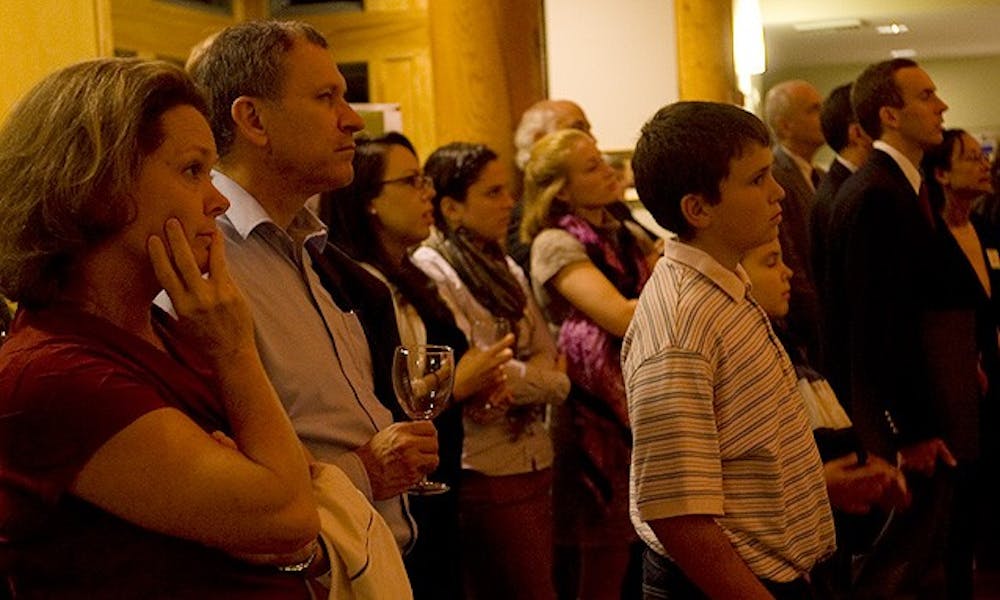Five years after its founding, the Duke Global Health Institute is celebrating its work in addressing medical concerns worldwide.
Created in 2006 with a mission to reduce the global health disparity, DGHI celebrated its fifth anniversary in a symposium Monday. DGHI, a joint initiative by Duke and the Duke University Health System, serves as an umbrella institute for faculty and students interested in global health. In addition to its current work in countries like China and Tanzania, DGHI is currently pursuing other collaborative partnerships abroad in Costa Rica, Nicaragua and Russia, among others, according to the DGHI website. The symposium also highlighted DGHI’s collaboration with Duke’s other schools and departments. The event included three panel discussions on chronic diseases, the environment’s effects on health and ways to strengthen health systems.
Keynote speaker Dr. Peter Piot, director of the London School of Hygiene and Tropical Medicine and a member of DGHI’s Board of Advisers, noted the growth of global health as a discipline and its role in addressing major health concerns.
“The term ‘global health’ didn’t exist when I was a medical student, or even 10 years ago,” Piot said.
Piot added that interest in global health peaked with the rise of AIDS.
Unlike other infectious diseases, AIDS affects every country in the world, Piot noted. The prevalence of AIDS is alarming, but the at-risk demographic is more concerning, he said.
“[AIDS is] affecting people who are normally dying the least—young adults,” Piot said. “We have babies and older people who die, [and] that’s been the pattern historically [with other diseases].”
In addition to an increased focus on AIDS and other communicable diseases, Piot noted that the field of global health is shifting toward the treatment of chronic diseases such as hypertension and diabetes. According to the World Health Organization, chronic diseases are the leading cause of death worldwide, representing 63 percent of all deaths.
Although communicable and non-communicable chronic diseases are at the forefront of global health, Piot emphasized that social issues such as maternal mortality, child health, reproductive health and family planning, malnutrition and access to primary health care are all major concerns.
An interdisciplinary approach is key for a strong global health program, Piot said.
“What makes [DGHI] unique, why I am committed to come here, is that Duke Global Health is looking beyond the traditional boundaries of global health... by involving the University as a whole,” he said. “It’s a truly global institute.... It’s what the world needs for the future and what the University needs for the future.”
During the past five years, the institute has grown to reach other areas on campus. DGHI faculty members are involved in various departments such as economics and public policy, said DGHI Director Michael Merson.
“We’ve involved more and more faculty from around the campus,” said Merson, who also serves as the interim vice president and vice provost for the Office of Global Strategy and Programs. “People who are doing work in their particular area of expertise [have] decided they would work in a different country or team up with another school to examine a particular health issue.”
With a record number of students involved in the global health certificate program, DGHI is examining ways to increase the institute’s involvement in undergraduate education, Merson said.
“We have the Focus program; we have the undergraduate certificate program; and we have many students doing DukeEngage programs abroad in global health,” he said. “But we’re trying to see what else we can do for undergraduates.”
Provost Peter Lange credited DGHI’s success to its commitment to emphasize interdisciplinary studies, become a global institute and use knowledge to serve society.
Duke’s interdisciplinary studies are unique, Lange noted, because they bring together different graduate schools and the medical center in addition to bridging the arts and sciences.
“We’ve had fabulous leadership; we’ve had faculty rise to the opportunity; we’ve had students rise to the opportunity—and in doing so, we’re actually changing the culture itself,” Lange said. “All of the benefits that we provide to the world feed back to us as a University and make us a better University.”
Get The Chronicle straight to your inbox
Signup for our weekly newsletter. Cancel at any time.

